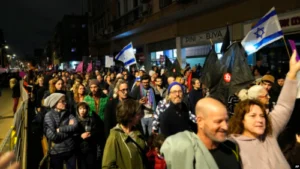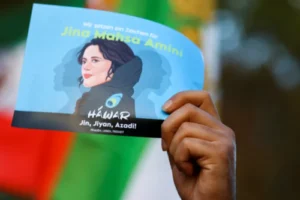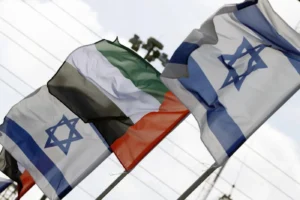
The National Interest Foundation Newsletter
Issue 174, January 12, 2023
Happy New Year’s and welcome back to our NIF Newsletter. In this week’s headlines: we provide analysis into the largescale protests in Israel against Benjamin Netanyahu’s new far-right government, Harvard’s denial of respected human rights advocate and former head of Human Rights Watch over criticism of Israel, the ongoing demonstrations to stop the execution of protestors in Iran, and Israel’s delegation meetings with the UAE ahead of the Negev Summit in spite of ongoing tensions.
Israelis Protest New Government

Largescale protests were held because of concerns for the future of Israeli democracy. (Photo from AP)
Thousands of Israelis Protest Netanyahu’sFar-Right Government
Thousands of Israelis gathered in Tel Aviv to protest plans by Prime Minister Benjamin Netanyahu’s newly elected far-right government. The protestors, led by left-wing and Palestinian members of the Knesset, are concerned the new government threatens the democracy and freedoms of the Israeli and Palestinian people. The most right-wing and religiously conservative government in the country’s entire history has planned sweeping reforms, including the expansion of illegal settlements in the occupied West Bank and to weaken the power of the judiciary. The protestors could be seen carrying signs with slogans like “Democracy in danger” and “Together against fascism and apartheid.”
Critics have accused the government of working to actively dismantle the judiciary in order to upend Israel’s checks and balances. This will undermine democratic institutions in place and give nearly absolute power to Netanyahu’s far-right government. The proposed policy was announced by Justice Minister Yariv Levin. His proposal calls for a series of sweeping changes aimed at weakening the Supreme Court. One of the proposed changes would be to allow legislators to pass laws the court has struck down and deemed unconstitutional. Overriding the Supreme Court’s decisions would only require a simple majority of 61 votes. His announcement came a day before the justices were to debate a controversial new law that will allow politicians convicted of tax offences to serve as Cabinet ministers.
Netanyahu’s ultra-Orthodox and ultranationalist allies also hope to reverse the Supreme Court ruling that outlawed Israeli outposts on private Palestinian land in the occupied West Bank. This reversal would allow Netanyahu to further expand settlements and continue the theft of Palestinian land in the occupied West Bank. Expansion will almost certainly lead to intensified violence. They also hope to continue the protracted detention of African asylum-seekers and officially make the ultra-Orthodox population of the country exempt from the country’s mandatory military service. He claims that this will strengthen the courts and restore the public’s faith in them. If history is any indicator, all this will do is weaken the courts and destroy the checks and balances system that keeps one portion of the government from gaining too much power. The Knesset, under the control of the far-right, will gain an unprecedented amount of power with no entity to keep them in check. “It will be a hollow democracy,” says Amir Fuchs, a senior researcher at the Israel Democracy Institute think tank. There has also been talk of watering down the attorney general’s authority by splitting the position into three roles, two of which would be political appointments.
The protestors also called for peace and coexistence between Jews and Palestinian residents in the country. “We are here to say loud and clear that all of us, Arabs and Jews and different various communities inside of Israel, demand peace, equality and justice,” says Rula Daood of Standing Together, a grassroots movement of Palestinians and Jews. Many experts are not optimistic about the future of democracy in Israel as Netanyahu’s far-right government continues to dismantle essential institutions. If something positive can be taken out of Israel’s situation, it is the growing unity among Palestinians and Israeli Jews who are becoming united in their fight for true democracy.
Former HRW Head Denied Position

Kenneth Roth was denied a fellowship at the Harvard Kennedy School because of his criticism of Israel’s human rights record. (Photo from AP)
Former Human Rights Watch Head Denied Position at Harvard Over Israel Criticism
The prestigious Harvard University has recently received criticism after rescinding a fellowship offer from Kenneth Roth, the former executive director of Human Rights Watch, over the group’s criticism of Israel. Among the organizations condemning Harvard’s decision are the American Civil Liberties Union (ACLU) and Pen American. Both of these organizations are well respected advocates for freedom of expression. The ACLU called the refusal “profoundly troubling.” In a self-authored op-ed in The Guardian, Roth called into question the reason why Harvard’s Kennedy School had retracted their offer. As far as anyone can tell, the reason why his fellowship was vetoed by Douglas Elmendorf, the Kennedy school’s dean, was because of his concern with the potential reaction of donors. “If any academic institution can afford to abide by principle, to refuse to compromise academic freedom under real or presumed donor pressure, it is Harvard, the world’s richest university.” Elmendorf himself sighted a so-called anti-Israel bias. He referenced the multiple tweets and articles by HRW that were critical of Israel’s treatment of Palestinians. Chief among these articles was the 2021 report titled “A Threshold Crossed.” In this report, HRW outlines the persecution of the Palestinian people by Israeli authorities. The piece concluded that these crimes constituted apartheid. This article was met with an intense amount of resistance from the pro-Israel lobby. Elements of the immensely powerful lobby, including NGO Watch have welcomed this decision. This organization, headed by Gerald Steinberg, reports on alleged anti-Israel bias by international NGOs.
Originally recruited by the Harvard Kennedy School’s Carr Center for Human Rights Policy, Roth seems like the perfect candidate. He has been informally involved with the school since its founding in 1999. Roth had recently left HRW after leading it for 29 years. During his tenure as leader, he had grown the organization’s budget from $7 million to nearly $100 million and expanded the number of employees from 60 to 550. The organization now monitors over 100 countries for human rights abuses. Roth was dubbed the father of human rights by The New York Times just last year. HRW, under his leadership, played an instrumental role in the establishment of the International Criminal Court and securing the convictions of many of those tried there. As far as the charges of anti-semitism and bias against Israel, there has never been any credible evidence that either HRW or Ken Roth has been biased against Israel. Human Rights Watch has only provided an unrelenting resolve to hold human rights abusers and authoritarian governments accountable.
Kenneth Roth is qualified for this position in every sense of the word. Dean Elmendorf’s withdrawal of the fellowship position offer violates freedom of speech. It also sends a chilling effect throughout the academic world showing that any criticism of Israel, no matter how justified, could potentially be a career ending move. This stifles academic freedom and will further the whitewashing of Israeli crimes against the Palestinian people. In his op-ed, Roth recognizes that he has long been the target of the pro-Israel lobby. They have accused him of anti-Semitism, despite his father being a Jewish refugee from Nazi Germany. He often cites this as the driving force for his work in human rights. Academic organizations cannot and should not bow to donor-driven censorship. Moving forward, universities should be urged to not accept contributions from donors who will use their influence to censor academic work. Kenneth Roth has now accepted a visiting fellowship at the University of Pennsylvania.
Iranians Protest Execution

Demonstrations in Iran continue as protestors push to prevent execution of fellow protestors. (Photo from Reuters)
Iranians Protest in Front of Rajaei-Shahr Prison to Stop Executions
Protests around Iran continue as dozens of people demonstrate in front of Rajaei-Shahr Prison in Karaj, Iran. These protests come amid reports that two more men could soon be executed for their links to the ongoing protests in Iran. The two men are 22-year-old Mohammad Ghobadlou and 19-year-old Mohammad Boroughani. Their families were among those protesting. Ghobadlou was arrested for allegedly killing a member of the Iranian security forces with a car. Bouroughani was convicted of moharebeh, or “waging war against God,” for allegedly using a knife to kill a member of the security forces. Their convictions were confirmed by the country’s Supreme Court and the men were moved to solitary confinement, causing concern among their family members that they would be executed imminently. Ghobadlou’s mother, who has previously said he has bipolar disorder, can be seen in a video of the protests speaking to the crowd. In her speech, she explains that 50 doctors have signed a petition calling for the judiciary chief to establish a committee to review her son’s mental health. Iran has so far executed four men in cases linked to the protests, which are a result of the death of Mahsa Amini. Amini was a young Iranian who died while in custody of the country’s morality police. She was arrested for alleged non-compliance with a mandatory dress code for women. All 4 of the men were hung, one publicly from a crane in Mashhad.
Amnesty International has said that there are more than two dozen people who could be at risk of execution in cases related to the protests. Three more men received preliminary execution sentences earlier this week. Many others have received jail sentences, with professional footballer Amir Nasr Azadani receiving 26 years in prison for his acts of defiance against the Iranian government. Iranians, including a number of celebrities, have condemned the executions, saying that justice cannot be achieved through execution. At least 519 people have also been killed while protesting according to the Human Rights Activists’ News Agency. The protests are not limited to Iran, as there have also been protests by many Iranians living in other countries. These protests are important because they keep the public’s attention on what is happening in Iran. Activists have declared that the protests have halted the executions “at least up to this moment.”
The weaponization of the police force along with excessively harsh punishment is a keystone of many authoritarian regimes. It is the Iranian government’s goal to send a chilling message to the protestors. This method is often employed because it carries significantly less risk for the government in power and usually attracts significantly less condemnation, as it is easier to censor the proceedings of a trial than a public protest. Because of this, it is ever more necessary that democratic governments along with NGOs like Amnesty International remain as vigilant as possible in order to ensure that these crimes are recorded. This makes the possibility of justice all the more likely, as too many times in the past, repressive regimes have been able to operate without accountability.
Israeli-UAE Tensions Ahead of Summit

Tensions have been festering as the Negev Summit nears. (Photo from AFP)
Israeli Delegation Meets with UAE Despite Tensions
A delegation of senior Israelis met with officials from the United Arab Emirates to prepare for the next meeting of the Negev Summit of Middle Eastern states, which is to be held in Morocco. The Negev Summit is a product of the Abraham Accords in which the signing countries, Israel, the UAE, Bahrain, Sudan, and Morocco, meet to discuss regional security, energy, education and tolerance, food and water security, and tourism. This meeting took place despite growing tensions between the two countries, as the actions of the far-right Israeli government begins to take its toll. The UAE recently politically snubbed Israel by requesting at the behest of the Palestinian Authority that the United Nations Security Council meet to discuss the status quo of the Al-Aqsa Mosque. The UAE also strongly condemned the storming of the mosque courtyard. This request was in response to Israeli National Security Minister Itamar Ben-Gvir’s visit to the Mosque, which drew international outcry for unnecessarily raising tensions and violating the status quo that has been agreed upon and largely respected for decades until recently. The Al-Aqsa Mosque sits atop an area known as the Temple Mount in the Jewish faith. The compound is a holy site in both Islam and Judaism. This has made it a point of contention between Muslim Palestinians and Jewish Israelis. The status quo has long regulated when and where people of each faith can worship. Ben-Gvir’s visit was just the latest violation in the long list of times ultra-nationalist orthodox Jews have stormed the mosque.
This spat continues to show the folly of the Abraham Accords. While hailed as a breakthrough by those who signed it, critics have pointed out that the agreement is shallow and economically focused. It has not made real progress towards peace. The agreement is largely focused on transactional agreements that had to do with intelligence sharing and arms dealing. It is a thinly veiled deal between repressive regimes to assist each other in suppressing their citizens with shared intelligence and weapon systems. The respective populations of the Arab countries in the agreement still have strong negative views of the Israeli government. The treatment of Palestinians is still a very important issue among Arab nations, and the Abraham Accords did little to change any of these facts. They have done even less to further peace in the Middle East. Israel was not compelled to cease their theft of Palestinian land, nor have they shown interest in peacemaking at all. The only real effect this agreement had has been to dump more weapons into the region. This does not serve U.S. interests or the interests of anyone in the region. It will not bring the promised economic relief to Palestinians, and will only take away further non-violent avenues in which Palestinians can hope to gain justice, leading to more violence in the region.
It is imperative that the Abraham Accords are treated as not a peace accord, but as a shallow economic agreement with no peacemaking potential. A comprehensive peace deal between Israel and Palestine is the only way there will be true peace and normalization between Israel and the Arab world.
